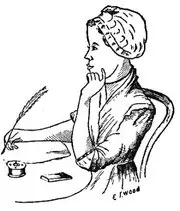 Phillis Wheatley (1753 – December 5, 1784), also spelled Phylis Wheatley, was born in Senegal in Africa, but was captured and sold into slavery at the age of 7. Around 1760 she was purchased by the Wheatley family of Boston, and was in fact practically adopted by the family which owned her. She was given a fairly extensive home education, including Latin, Greek, and Biblical studies. She became a very accomplished poet, with her first poem published when she was only 13.
Phillis Wheatley (1753 – December 5, 1784), also spelled Phylis Wheatley, was born in Senegal in Africa, but was captured and sold into slavery at the age of 7. Around 1760 she was purchased by the Wheatley family of Boston, and was in fact practically adopted by the family which owned her. She was given a fairly extensive home education, including Latin, Greek, and Biblical studies. She became a very accomplished poet, with her first poem published when she was only 13.
In 1770 she wrote a poetic tribute on the death of the Calvinist George Whitefield that received widespread acclaim in Boston. In 1772 she was examined by a group of Boston luminaries including John Erving, Rev. Charles Chauncey, John Hancock, Thomas Hutchinson, the governor of Massachusetts, and his Lieutenant Governor Andrew Oliver. They concluded that she had in fact written the poems ascribed to her and signed an attestation which was published in the preface to her book Poems on Various Subjects, Religious and Moral published in Aldgate, London in 1773. It was published in London because publishers in Boston had refused to publish the text. Phillis with her master’s son, Nathanial Wheatley went to London, where Selina, Countess of Huntingdon and the Earl of Dartmouth helped with the publication.
Her work was lauded by some of the leading figures of the American Revolution, including George Washington, who met with her to thank her for a poem she had written in his honor. Wheatley’s acclaim was not, however, universal. Thomas Jefferson was among the harshest critics of her poetry, writing “The heroes of the Dunciad are to her, as Hercules to the author of that poem.”
After the death of John and Susannah Wheatley, Phillis married a free black grocer named John Peters. She herself did domestic work as a servant. Neither hard work nor artistic ability were to bring her prosperity, and she died in poverty in 1784.
